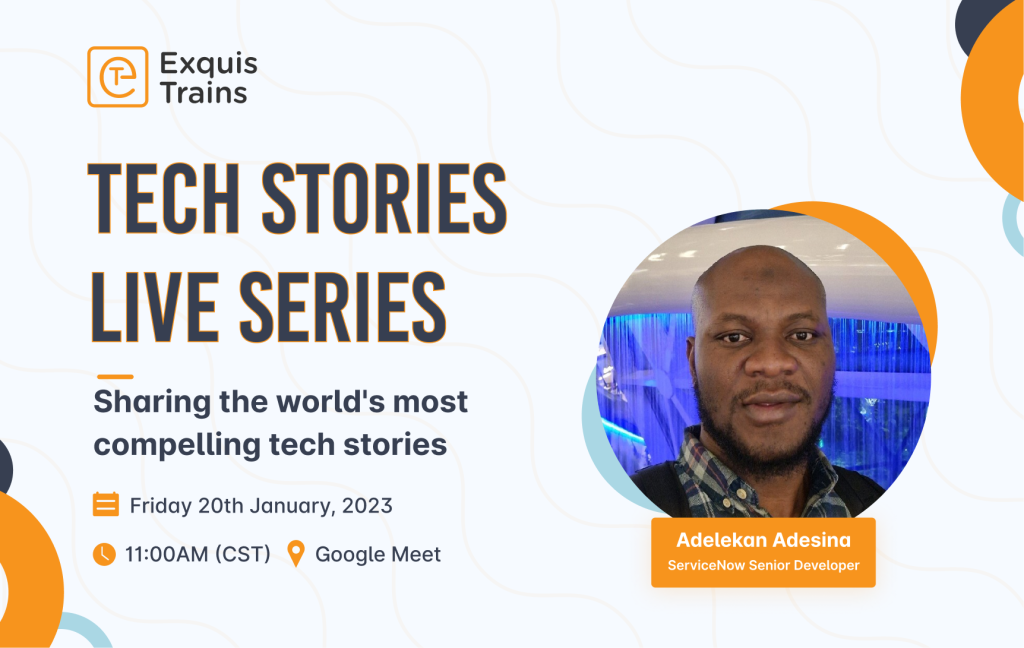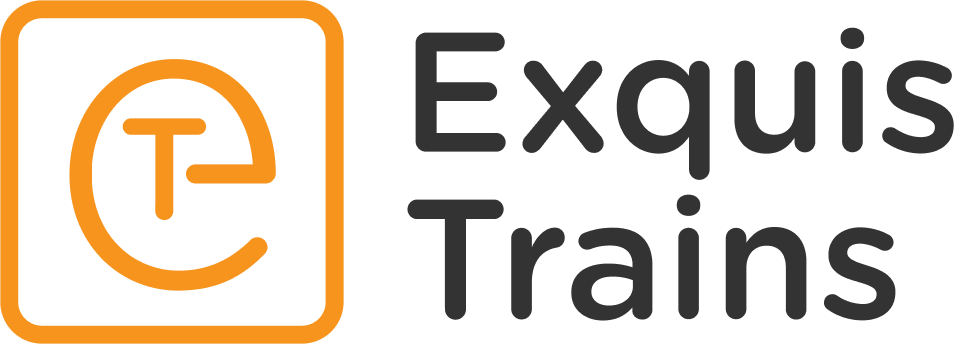This is Exquis Trains and we’re happy to have everyone here for this series we call Tech Stories.
The whole idea behind Tech Stories is for us to share original stories of techies in the tech industry.
We know that most times when people are coming into tech, they think that tech is hard but if they can learn and share from the stories of people who are doing it, it could make it a lot easier for them.
That’s why we started the series. We want to have people hear from techies and ask questions, take one or two things away, so that you could also use that in your journey as well.
Our guest today is Adelekan Adesina. Enjoy our interview with him.

The Interview
Adelekan Adesina: My name is Dr. Adelekan Adesina, I’m a trained vet from the University of Ibadan.
I’m now an analyst/developer on the ServiceNow platform, which is a cloud platform as a service product.
That’s where I do my software development. I presently work with the University of Warwick in Coventry, Warwick, United Kingdom.
Exquis Trains: How do you merge being an analyst and a developer? Are there similarities between both roles?
Adesina: Thank you very much for that question. I work with the ServiceNow platform.
ServiceNow provides a product to businesses where business subscribes to that product. It’s a Cloud Platform-As-A-Service (PAAS) product where different companies all over the world make their subscriptions.
We have Infrastructure-As-A-Service (IAAS), Software-As-A-Service (SAAS), Service is a Platform-As-A-Service (PAAS). That’s where I build my own applications.
Being an analyst and a developer are roles that are not very exclusive of one another. If you want to be a very good developer, you have to be a good analyst.
To be a good analyst, you gather requirements that your customers need to solve their business problems.
There has to be a problem because applications are not just built and so, you need to gather requirements that you need to build this application.
In gathering these requirements, you need to understand the process of how these things work at the end of the customers.
You will bring your own technical knowledge and expertise as a developer to implement whatever requirements you are given into solving business problems.
There’s no way you can separate the two.
Of course, there are developers that are not analysts but if you’re given requirements and you don’t know why, that makes you a developer.
But if you’re given same requirements and you understand why you’re developing what you’re developing, then that makes you an analyst and a better contribution to the team.
Exquis Trains: What programming languages have you engaged in the past? Which ones did you start with and which ones do you currently use in your work at the moment?
Adesina: Majorly, on the ServiceNow platform, the programming language is JavaScript. The JavaScript that’s currently being used is not the current version. We stick with ECMA5 for now.
ServiceNow is not worried about that and this is why they are not worried.
Most of the things you need to build your application have been provided out of the box.
You would be surprised that on ServiceNow, if you need to build a command, it might just be a click of the box because ServiceNow has done the dirty work of doing those development.
You just have to know when and how to get to that box. We do not write a lot of languages.
In fact, ServiceNow discourages writing a lot of scripting on their platform. At the maximum, scripting should not be more than 20%.
I will say JavaScript and HTML knowledge because there are notifications where you have to understand what the HTML syntaxes are. Those are the two languages.
Of course, in the past, I’ve learnt Python but I’m not using it now. But if you’re talking about JavaScript, I’m not a full professional but at least, I know what’s required of my job and I can make use of it to get to where I’m going.
Exquis Trains: How did you get into tech? What was your story? What really made you get interested in tech? How did you start?
Adesina: The period after high school and waiting to get into college, I started with basic desktop publishing, Microsoft Word, Excel, PageMaker, CorelDraw… That was the beginning of the journey.
Going into veterinary medicine made me forget them. I just picked what I needed to get my degree which was majorly PowerPoint and Microsoft Word. I graduated and life continued.
I’m someone who always likes to know about my environment and get better. Then, I was developing myself as a Vet.
One of my friends lives in the US. Anytime I try to contact him, he always says he’s busy. “What are you doing to be busy?”
He will say that he’s coding. He makes it look like a big deal. He mentioned ServiceNow.
I went online, did some research, did what I could do, and made him know that he wasn’t the only one that could do what he was doing and he was shocked.
I started speaking in his language and he was interested and wowed. Then he pointed me in the right direction.
That’s where the journey of ServiceNow started.
He introduced me to the platform, showed me how to use the platform and I started gathering certifications.
To be honest, in tech, the journey does not stop. This ServiceNow I’m talking about, we have two upgrades every year. That means you have 4 or 5 months to use the present version of whatever instance you’re having.
That also means that you need to keep updating yourself so that you will be at the top of your game.
Learning in tech should never stop and it is a continuous process. I’m still learning; I’m open to learning.
That’s my story.
What my friends were earning also motivated me to try out tech.
As much as money is the motivation, the passion should always be there because if you’re just after money, you will find out that you will get the money but you will not really get the fulfillment.
You get fulfilled when you walk into the office and people come to you and say, “Thank you for what you’ve done. Thank you for helping us achieve that.”
That’s a bigger fulfillment than just getting the money to be honest with you.
My wife will always say, “If you cannot solve the problem, help people that solve the problem.”
Helping the people that solve the problem makes you a better person.
Exquis Trains: How were you able to manage work, and having time for friends and family? Did you get busy like your friend was always saying? (Smiles)
Adesina: Everything is now work from home. I am really not that busy as he is. I still have time to talk with friends, I still have time to talk with family, I still have time to do a lot of things I’m supposed to do outside work.
Exquis Trains: What are the various career options that are opened to those who want to be an analyst or a developer.
Adesina: The world is going into the era of scraping whatever stack of hardware each company has. All of them are moving to the cloud now.
There’s a big opportunity with the cloud platform.
You will find a lot of these opportunities with Amazon.
I have two certifications with Amazon and I understand that when you need to build a career, it might really be confusing when you’re starting out.
But if you study the trend of tech now, you would know that cloud computing is majorly one of the forces that in the next decade, it will still be relevant.
On Platform-As-A-Service, which is what I work with, we have career opportunities such as administrator, where you monitor what people do and you help them achieve their daily requests.
Calls can come in for you to get things done or you could just monitor the platform and see that it is working fine.
You also have the analyst route, where you are just there to make sure that you gather requirements in order to help understand the process without talking jargon.
You can be an architect where you are there to structure the processes or the workflow and manage these services, implement them in your development and see how to make business processes better.
Watch the way the trend is going. Everybody has a single target and the target is: making their business prices better.
If you like, you can be a developer where you build configurations.
You build applications and do a lot of background work and you help achieve business solutions by customization using your skill and whatever your knowledge is.
If you like, you can be an implementation analyst also. That’s another route that’s an interesting one.
There are also a lot of roles, a lot of career opportunities that are presently in the cloud computing aspect of tech.
Exquis Trains: When you were learning tech, how did you learn? Is it from books or videos or documentation? Share with us.
Adesina: I understand myself that I’m a very good self-learner. I grasp more when I do self- learning but in tech, you cannot get ahead of anybody if you’re doing self-learning alone.
At some point in your learning, you would need one or two advice or motivation, one or two people to point you where to go.
And you would continue to need that even when you’re working because experiences are gathered along the line.
My learning path was everything I could do.
If I get into a problem, I still call my friends in the US and Canada.
I also try as much as possible to pass down the knowledge, no matter how small it is, to the people that I can say that they are also passionate about what I’m doing.
That way, it makes it stick better.
I would continuously remember whatever I’ve studied. That’s my strategy.
I learn from videos, not much from YouTube because there are a whole lot of people there and you can be stuck for hours learning a little thing.
I took some courses from Udemy, but sometimes, if I get confused, I abandon them.
A lot of the courses I bought with my hard-earned money, I didn’t use them.
Of course, I learn a lot from documentation.
If you go into these documentation, you can grasp a lot of knowledge that you can apply while you’re working or sitting for an interview.
It would amaze the people at the interview and they will be wondering how you got that information. These documentation are publicly published.
I also learnt from community forums where you discuss your problem and people come to respond to you. If it is helpful, you take it. If it’s not, you ask further questions.
I have also learnt by going to conferences.
Some conferences are overrated but most of them, you will pick one or two things, you will meet one or two people there that you can share ideas with even after the conference.
These are areas where you can learn. Learning is always continuous like I said.
Exquis Trains: We know that you’re a Nigerian but you currently reside in the UK. We want you to share with us your story of how you migrated from Nigeria to the UK and how the process went for you.
Adesina: Coming to the UK was not an overnight decision. It was something I had thought through well and I felt I will perform well in this environment because while I was in Nigeria, my friend in Texas gave me some tasks and I completed them.
He frequently sent tasks to me to solve. Eventually, he moved this into getting contract jobs. I started doing these contract jobs.
In an environment like the UK, all business processes require the skill of someone that can help them to deliver a solution to their business problem.
That means, in some instances, they want you to automate their process. I felt that I could be useful, more than I was in Nigeria.
I came in as a student to study for an MBA. While in the UK, in my first 3 weeks, I applied for a veterinary job in the government and I was given that job.
I was doing that job part-time because I was a student then.
While doing that job, I was doing MBA and I continued in the tech industry (not professionally now but also the crumbs I’m able to gather here and there).
After all these, I finished my studies and I applied (I didn’t really apply. I’ve never applied for a job. That’s an advantage when you know what you’re doing. I’ve never applied).
I get requests every time on LinkedIn. I got this request asking me if I was interested in joining University of Warwick as a developer and I responded to it.
Because I was on a student visa, I needed someone to sponsor my visa, to change it from the state it was to a skilled worker state. The University of Warwick was willing to offer that.
A bit of advice to tech guys.
Tech guys don’t really look into schools. A lot of schools in the United Kingdom will need those skills you have.
Schools have unlimited sponsored rights unlike jobs that have an amount of people they can sponsor.
Schools can sponsor you if you have the right skills.
That’s an area to look at if you’re looking for a job in tech.
They might not be paying as much as you want but they will give you your rights to work.
Exquis Trains: Thank you so much for taking the time out for this interview.
Join Fortune 500 companies as a no-code professional today
Share this article to your network.







